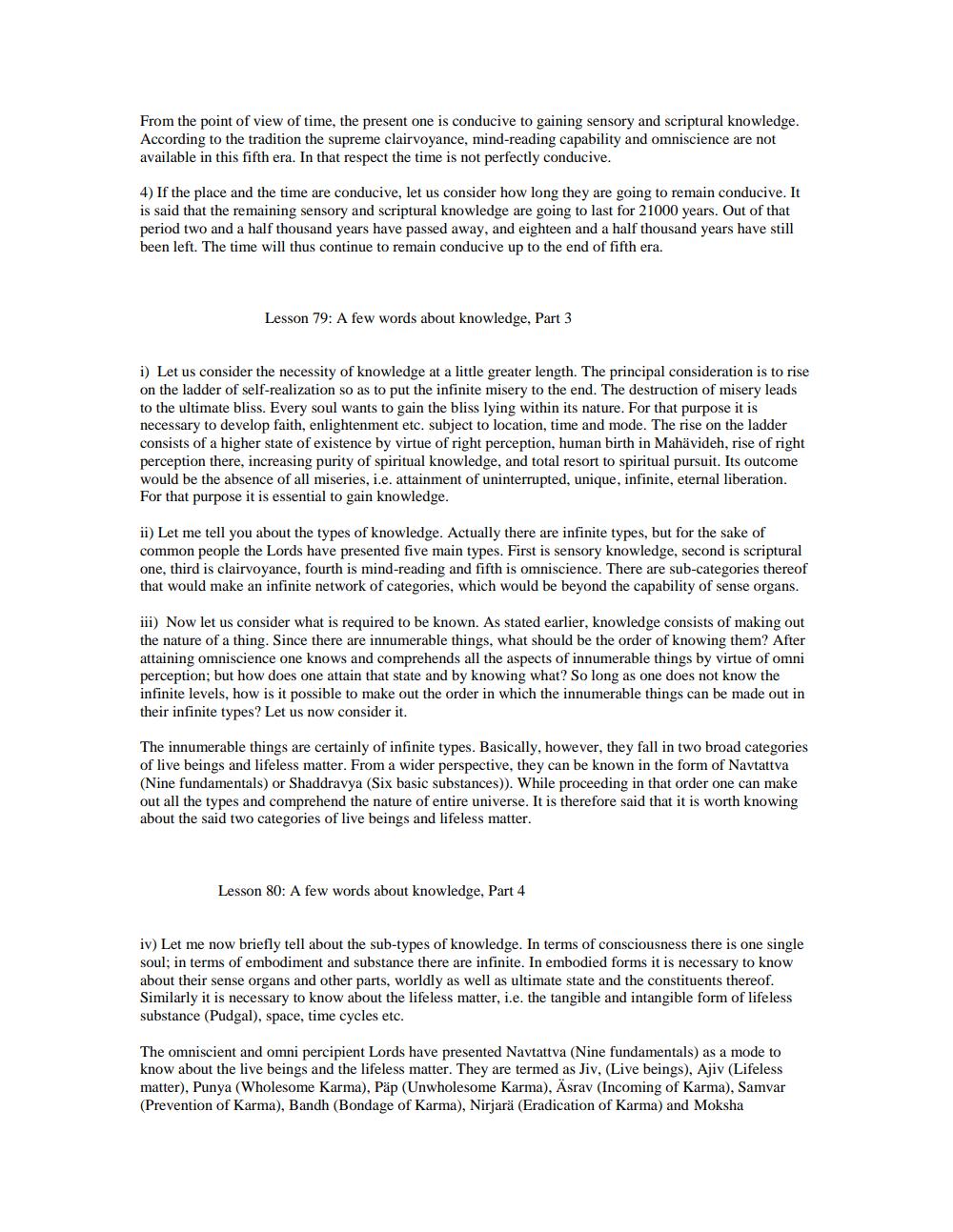________________
From the point of view of time, the present one is conducive to gaining sensory and scriptural knowledge. According to the tradition the supreme clairvoyance, mind-reading capability and omniscience are not available in this fifth era. In that respect the time is not perfectly conducive.
4) If the place and the time are conducive, let us consider how long they are going to remain conducive. It is said that the remaining sensory and scriptural knowledge are going to last for 21000 years. Out of that period two and a half thousand years have passed away, and eighteen and a half thousand years have still been left. The time will thus continue to remain conducive up to the end of fifth era.
Lesson 79: A few words about knowledge, Part 3
i) Let us consider the necessity of knowledge at a little greater length. The principal consideration is to rise on the ladder of self-realization so as to put the infinite misery to the end. The destruction of misery leads to the ultimate bliss. Every soul wants to gain the bliss lying within its nature. For that purpose it is necessary to develop faith, enlightenment etc. subject to location, time and mode. The rise on the ladder consists of a higher state of existence by virtue of right perception, human birth in Mahävideh, rise of right perception there, increasing purity of spiritual knowledge, and total resort to spiritual pursuit. Its outcome would be the absence of all miseries, i.e. attainment of uninterrupted, unique, infinite, eternal liberation. For that purpose it is essential to gain knowledge.
ii) Let me tell you about the types of knowledge. Actually there are infinite types, but for the sake of common people the Lords have presented five main types. First is sensory knowledge, second is scriptural one, third is clairvoyance, fourth is mind-reading and fifth is omniscience. There are sub-categories thereof that would make an infinite network of categories, which would be beyond the capability of sense organs.
iii) Now let us consider what is required to be known. As stated earlier, knowledge consists of making out the nature of a thing. Since there are innumerable things, what should be the order of knowing them? After attaining omniscience one knows and comprehends all the aspects of innumerable things by virtue of omni perception; but how does one attain that state and by knowing what? So long as one does not know the infinite levels, how is it possible to make out the order in which the innumerable things can be made out in their infinite types? Let us now consider it.
The innumerable things are certainly of infinite types. Basically, however, they fall in two broad categories of live beings and lifeless matter. From a wider perspective, they can be known in the form of Navtattva (Nine fundamentals) or Shaddravya (Six basic substances)). While proceeding in that order one can make out all the types and comprehend the nature of entire universe. It is therefore said that it is worth knowing about the said two categories of live beings and lifeless matter.
Lesson 80: A few words about knowledge, Part 4
iv) Let me now briefly tell about the sub-types of knowledge. In terms of consciousness there is one single soul; in terms of embodiment and substance there are infinite. In embodied forms it is necessary to know about their sense organs and other parts, worldly as well as ultimate state and the constituents thereof. Similarly it is necessary to know about the lifeless matter, i.e. the tangible and intangible form of lifeless substance (Pudgal), space, time cycles etc.
The omniscient and omni percipient Lords have presented Navtattva (Nine fundamentals) as a mode to know about the live beings and the lifeless matter. They are termed as Jiv, (Live beings), Ajiv (Lifeless matter), Punya (Wholesome Karma), Päp (Unwholesome Karma), Asrav (Incoming of Karma), Samvar (Prevention of Karma), Bandh (Bondage of Karma), Nirjarä (Eradication of Karma) and Moksha




